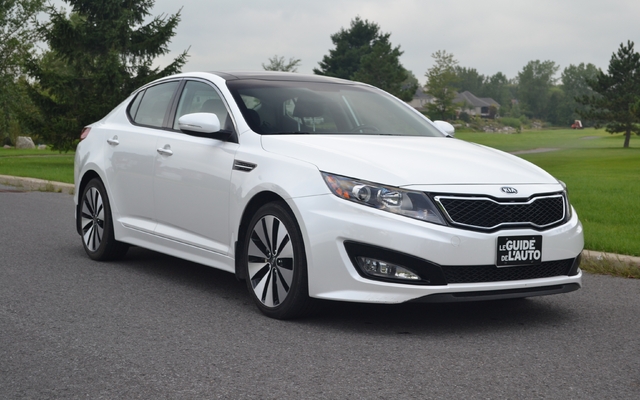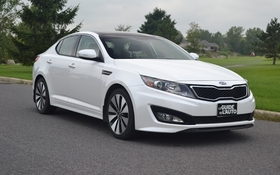2011 Kia Optima: She’s all that

| Strong points |
|
|---|---|
| Weak points |
|
When test driving a vehicle, there are certain weeks when we can’t help but get noticed by neighbours and passers-by. It often happens when we’re driving a sports car or a luxury car, so no one would have predicted that a car bearing the Kia emblem would one day make the list of top head-turning vehicles. But that’s exactly what happened with the new 2012 Optima, a nice car that raised more than a few eyebrows during our test drive. And the best part of all that is, unlike vehicles that are normally on our “wow” list, a large part of the population can realistically hope to drive – or even own – this car.
Making a good case
The 2012 Kia Optima follows the Magentis and is intended to rival the Hyundai Sonata, Ford Fusion, Honda Accord, Mazda6 and Toyota Camry. Big names all of them, but the Optima comes armed with more than one trick up its sleeve, so as not to get pushed around. With a base version available for under $22,000, it comes factory-standard with a 2.4-litre four-cylinder engine with direct injection and 200 horsepower for 186 lbs-ft of torque. It’s more powerful than its rivals’ four-cylinder engines. In fact, only the 190-hp Honda Accord comes close, while the 169-hp Toyota Camry remains well behind. The Optima’s engine is paired with a six-speed manual transmission or an optional six-speed automatic. The Ford Fusion is the only one in the bunch that can be equipped with all-wheel drive, which is one of the only regrets we have about the Optima.
The same can be said about the more posh version, the Optima SX. With its supercharged 2.0-litre four-cylinder engine featuring 274 horses, it takes the prize once again for power compared to its rivals with V6 engines. The Optima’s engine is so interesting mainly due to its generous 269 lbs-ft of torque starting at 1,750 rpm. And you guessed it, thanks to its reduced capacity; this turbocharged four-cylinder also features the lowest fuel consumption in the group.
Finally, the Optima will also be offered very shortly in a hybrid version, and it will obviously bring additional fuel economy. Under the hood, there’s a 2.4-litre 166-hp gas engine paired with a 30 kW electric motor that adds 40 more horses.
A real looker
I’ve written in the past that Korean cars lack style and originality. Kia finally seems to understand the importance of looks and chose to hire Peter Schreyer – the renowned designer formerly at Audi – a few years ago. We’re starting to see the fruits of this decision, and in the case of the Optima, the result is more than convincing. You’ll like the Optima’s technology and mechanical qualities, but its eye-catching and charming lines will really grab your attention. Passers-by frequently commented on how attractive it was. The sportier version, the SX, is even nicer still, primarily because of its 18-inch whels. It features a superb design and obvious attention to the smallest detail in its exterior presentation. It’s rare that a colour shows off a car so well, but with the Optima, white really suits it, without a doubt due to the fact that white highlights all of the black contrasts, such as the roof, rims, front grille and lateral air intakes.
I had a blast running a little guessing game in which I’d mask the Kia emblem in the front and make people guess the car’s brand. No-one got it right; they all figured that it was a new model by a more famous manufacturer. Everyone was surprised when I lifted my hand and revealed the Kia logo, and they were even more surprised when I mentioned that the price of our test model was $33,695 for a fully loaded Optima SX! Now that’s a deal...
Just as nice on board
Same goes for the interior. Note the remarkable attention to detail as every component seems to have been meticulously considered. The ergonomics of the dashboard are great. The central section is turned slightly toward the driver, thus facilitating access to the various controls. Everything is simple and very intuitive. The instrumentation is modern and the central part houses a multifunction screen that displays data from the on-board computer. Our test model’s two-tone leather seats, imitation carbon fibre trim and metallic pedals all stood out. Basically, Kia thought of everything. They even thought of sounding a tone when the engine is cut and you leave the car. However, seats with a tad more lateral support would have been nice. After all, we aren’t all the size of the typical American!
On the road
When you drive the Optima, the first thing you notice is its slightly heavy steering at low speed. Those who like steering with a lot of assistance will be disappointed, but it’s a lot less noticeable at higher speeds. Our Optima SX had a 274-hp four-cylinder turbo under the hood. This engine is surprisingly adaptable and has surprisingly vigorous pick up. Put the pedal to the metal and you’ll feel the engine deliver its torque instantly. The era of turbocharged engines that have a slight delay before reacting seems to be over. However, all that power comes with a slight torque effect, and the condition of our roads won’t help the matter whatsoever.
As for the Optima SX, power is relayed to the front wheels via a six-speed automatic gearbox. It shifts gears without the slightest hesitation and many will like the wheel-mounted shifters that give you full control of the gears and the engine speed. While is kissing cousin, the Hyundai Sonata, offers a suspension that maximizes comfort, the Optima is a little sportier. Its suspension, coupled with a very rigid body, gives it dynamic and very pleasant handling on small, winding roads. Okay, so the Optima will never be mistaken for a great sports car, it sure is playful.
To wrap things up, the Optima features one last noticeable advantage over the competition: a 5 year/100,000 km basic warranty. It’s hard to believe that Kia gave birth to so nice a car. This will definitely force the competition to react, as the accolades have only just begun to start coming in for the Optima. You have to hand it to Kia for a job well done.











